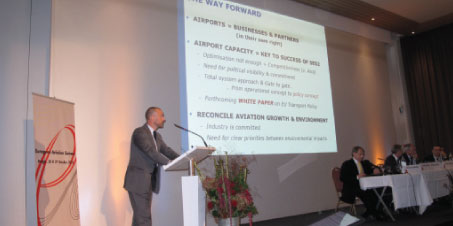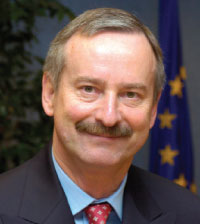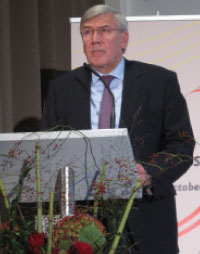
Olivier Jankovec, Director General, ACI EUROPE, addressed the Summit in a plenary session focusing on the Single European Sky.
The Summit brought together 400 high-level representatives of the European aviation community to address the challenges facing European air transport. Participants included Olivier Jankovec, Director General, ACI EUROPE and Dr Stefan Schulte, Fraport CEO, who also spoke on behalf of ACI EUROPE in his capacity as a Vice President of the Board. The calibre of speakers highlighted the importance of the event, with representatives from the European Commission, ECAC, EASA, the Civil Aviation Authorities of the UK, Portugal and Romania, Lufthansa, Brussels Airlines, Airbus, the Federal Aviation Administration, SESAR, CANSO, AEA and ELFAA.
The event was opened by the Belgian State Secretary for Mobility Etienne Schouppe, current President of the Transport Council, and Siim Kallas, Vice-President of the Commission, responsible for Transport, with Belgian Prime Minister Yves Leterme also addressing the Summit.
The ‘Declaration of Bruges’ called for decisive action in four areas: Improving the competitiveness of the European aviation industry, achieving the Single European Sky, protecting European citizens with the highest safety and security standards, and ensuring the sustainability of aviation.
In terms of competitiveness, there was an emphasis on building on Europe’s successful liberalisation strategy to meet mobility demands, extending the European Common Aviation Area and offering new market opportunities, which reflects one of ACI EUROPE’s top priorities for European aviation. The Declaration also calls for the “reform of EU rules to eliminate capacity bottlenecks, so that efficiency of each link of the aviation transport chain is improved to give travellers and companies more value for money”.
‘Single European Sky essential’

Addressing delegates, Siim Kallas, Vice-President of the Commission, responsible for Transport said “One of my key priorities is to achieve the Single European Sky during my mandate. The accelerated implementation of the Single European Sky is crucial for the European air transport system.”
The Summit confirmed the European commitment towards achieving swift implementation of the Single European Sky, which will deliver a sustainable air traffic management system built on five pillars – regulation, safety, research & development, capacity, and human factor. Siim Kallas, Vice-President of the Commission, responsible for Transport said “One of my key priorities is to achieve the Single European Sky during my mandate. The accelerated implementation of the Single European Sky is crucial for the European air transport system. Inefficiencies of the Air Traffic Management system in Europe are responsible for 16 million tonnes of unnecessary CO2 emissions. The fragmentation of the airspace costs the sector €3 billion. The implementation of the Single European Sky is therefore not an option – it is an essential requirement for an efficient and sustainable air transport system in Europe.”
The Declaration also calls for the establishment of functional airspace blocks “within the agreed deadline of 2012, so that airspace corresponds to operational requirements and the needs of airlines, rather than to national borders”.
A crucial element of the safety agenda is delivering a harmonised set of rules using a total system approach developed by the European Aviation Safety Agency – this should be done through an efficient rule-making process in partnership with national authorities and taking into account stakeholders’ views. Meanwhile, regarding security, there was agreement that one-stop security should be pursued, alongside better use of shared intelligence and targeted controls on those who pose the greatest risk in order to prevent security incidents and facilitate travel. The Declaration also stresses the need for continued improvement of detection techniques and technologies by supporting research and development and by creating the legal framework to allow testing and certification of equipment.
Environmental sustainability

Belgian State Secretary for Mobility Etienne Schouppe, current President of the Transport Council, opened the Summit, which brought together 400 high-level representatives of the European aviation community to address the challenges facing European air transport.
The programme of the Belgian Presidency focuses on sustainable growth, and the Bruges Summit emphasised the importance of pursuing a comprehensive approach towards aviation’s environmental impact through working on new standards, investing in research and technology, improving air traffic management procedures and operational performance, and pursuing market-based measures through the inclusion of aviation in the EU’s Emissions Trading Scheme from 2012 onwards.
The Summit recognised the value of industry efforts to reduce carbon emissions, with a formal reference to ACI EUROPE’s Airport Carbon Accreditation.
A proposal was also made to establish a working group to enable the EU Council of Transport Ministers to better assess the mechanisms and impact of the European Emissions Trading Scheme on the competitiveness of European aviation.
The ‘Declaration of Bruges’ demonstrates a clear consensus on the key areas addressed during the Summit: Improving the competitiveness of the European aviation industry, achieving the Single European Sky, protecting European citizens with the highest safety and security standards, and ensuring the sustainability of aviation. Crucially, while it was agreed that accelerated implementation of the Single European Sky would improve the framework for a competitive and sustainable air transport system in Europe, it was also emphasised that this must be coupled with the required airport infrastructure and efficient use of existing infrastructure. There was also a consensus that a strong aviation industry is vital for the success of a strong European economy, acting as an engine of economic development for the regions.







